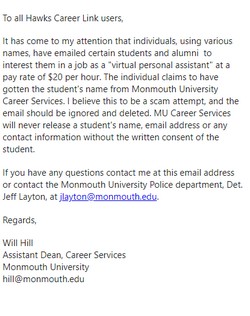The Board of Trustees approved a 3.69 percent increase to the University’s tuition and comprehensive fee, which was announced in an email sent to the campus community by President Patrick Leahy on Thursday, March 10. According to Leahy, this increase equates to roughly $1,536 per year.
In his email, Leahy noted that this marked the sixth consecutive year with an increase below four percent. “Even with this increase, Monmouth University remains one of the more affordable private colleges in the state and region, especially when financial aid is considered,” he wrote. Notably, 97 percent of Monmouth University students receive scholarships, grants, or other institutional aid.
Leahy also cited the University’s highest-ever rankings in the U.S. News & World Report roster of “Best Colleges”; “Washington Monthly’s 2021 Best Bang for the Buck Colleges: Northeast”; Money magazine’s “Best Colleges for Your Money”; inclusion on the Forbes list of “America’s Top Colleges”; and continued recognition of Monmouth’s academic excellence in Princeton Review’s “Best 387 Colleges: 2022” as evidence of success that has been made possible due to annual tuition increases.
“We have been among the fastest rising universities in terms of academic rankings over the past 10 years or so, which adds substantial value to students’ degrees, and the return on investment is something that will continue to accrue in both the near term and over many years,” he explained.
Additionally, Leahy’s email mentioned that there were two years in which the increase fell below three percent – the 2020-2021 increase was 2.75 percent and the 2021-2022 increase was 2.46 percent, largely due to the ongoing impact of the COVID-19 pandemic.
The 2020 Fall Opening Resolution from the Monmouth University Faculty Council called for the University to use the endowment and the reserves to supplement finances during the pandemic, rather than increasing tuition for students. Although the tuition and fee increases during the pandemic were some of the lowest seen within the past 50 years, they were still in violation of the Faculty Council Resolution.
“I understand that the school probably lost a lot of money when the pandemic first hit, but raising the tuition puts a significant amount of strain on students and their families. Tuition was already expensive before the pandemic,” said McKenzie Wasik, a senior homeland security student.
“Each year, the University scrupulously studies and models the budget for several months in order to determine an appropriate tuition adjustment for the following academic year. Budget requirements fluctuate from year to year, with various factors that affect both revenue and expenditures,” explained Leahy.
The traditional Monmouth University student experience was fundamentally altered by the conditions of the COVID-19 pandemic and the subsequent need for the implementation of various health and safety protocols. At the beginning of the pandemic, this meant that all classes shifted to a virtual format and in-person campus activities were severely restricted.
Still, Leahy noted that the pandemic came with its own unique set of costs. “In addition to the loss of revenue from residence halls and meal plans, costs for cleaning, testing, and contact tracing skyrocketed, especially when we returned to campus. The investments needed to provide a safe student experience were very real,” he explained.
“The tuition increase reflects the broader costs associated with ensuring student success,” continued Leahy. “Certain factors like inflation, negotiated salary increases, and physical plant maintenance will continue to be year-over-year considerations. Given these fixed constraints on our budget, we will continue to carefully steward our resources with responsible spending practices and innovative approaches to building our budget each year.
Along with increasing the 2022-2023 tuition and comprehensive fee, the University also announced a partnership with TouchNet PayPath that will introduce a 2.85 percent service fee when paying tuition by credit card. Effective the week of March 21, credit and debit card payments were no longer accepted in person, over the phone, or through the University’s lockbox payment system.
“TouchNet PayPath was selected after evaluating several providers. Since we already use TouchNet for other services, their product integrates seamlessly with the other student solutions we utilize, such as eBills, eRefunds and Payment Plans,” said William Craig, Vice President for Finance.
Craig also noted that the service fee charged by TouchNet PayPath is not new or uncommon. “Monmouth University has absorbed the credit card transaction fees charged by the card providers since we began accepting credit card payment for tuition, fees, room and board charges more than 35 years ago. Over time, the cost of these fees grew to approximately $1 million per year,” he explained. When we surveyed other colleges and universities in New Jersey, we found that almost all of them were charging a service fee to offset the merchant processing charges. The fee being charged is similar to what we found other schools are charging.”
Students who wish to avoid paying this service fee have other payment options, including check, e-checks, or cash. The University will also continue to offer a payment plan.
“I am concerned about the affordability of a college education, and we work hard to strike a careful balance between enhancements to the educational experience and tuition increases,” concluded Leahy.




